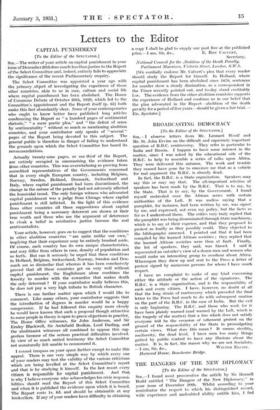Letters to the Editor
CAPITAL PUNISHMENT
[To the Editor of the SPECTATOR.] Snt,—The writer of your article on capital punishment in your issue of December 20th does much less than justice to the Report of the Select Committee and, indeed, entirely fails to appreciate the significance of the recent Parliamentary enquiry.
The Select Committee was appointed a year ago with the, primary. object. of investigating the experience of those other countries, akin to us in race, culture and social life where capital punishment has been abolished. The. House of Commons Debate of October 30th, 1929, which led to the Committee's appointment and the Report itself (p. 65) both make this fact abundantly clear. Some of your contemporaries who ought to know better have published long articles condemning the Report as " a hunched pages of sentimental rhetoric," " a mere poetic plea," and " the defeat of sense by sentimentality " without so much as mentioning abolition countries, and your contributor only speaks of " several " pages of the Report being devoted to this subject. The general public is therefore in danger of failing to understand the grounds upon which the Select Committee has based its recommendations.
Actually twenty-nine pages, or one third of the Report, are entirely occupied in summarising the evidence taken from other countries. This was overwhelming as proving from accredited representatives of the Governments concerned that in every single European country, including Belgium, Norway, Sweden, Holland, Denmark, Switzerland and Italy, where capital punishment had been discontinued, the change in the nature of the penalty had not adversely affected the homicidal trend. The only foreign witness who advocated capital punishment was a judge from Chicago where • capital punishment is still inflicted. In the light of this evidence from other countries all these suppositions about capital punishment being a necessary deterrent are shown at their true worth and those who use the argument of deterrence to cloak a belief in retributive justice become the real sentimentalists.
Your article, however, goes on to suggest that the conditions in other abolition countries " are quite unlike our own," implying that their experience may be entirely brushed aside. Of course, each country has its own unique characteristics, and may differ from others in race, density of population and so forth. But can it seriously be urged that these conditions in Holland, Belgium, Switzerland, Norway, Sweden and Den- mark are so dissimilar that whereas it has been conclusively proved that all these countries get on very well without capital punishment, the Englishman alone combines the ferocity to murder with the cowardice that makes death the only deterrent ? If your contributor .really believes this, he does not pay a very high tribute to British character.
There is one further matter upon which I would like to comment. Like many others, your contributor suggests that the introduction of degrees in murder would be a happy compromise. If he had followed this enquiry more closely he would have known that such a proposal though attractive to some people in theory is open to grave objections in, practice. The Home Office witnesses, Sir John Anderson, and. Sir Ernley Blackwell, Sir Archibald Bodkin, Lord Darling, and the abolitionist witnesses all combined to oppose this sug- gestion because of the serious practical difficulties involve& In view of 'so much united testimony the Select Committee not unnaturally felt unable to recommend it.
I cannot trespass on your space further except to make this appeal. There is one very simple way by which every one of your readers may test the validity of the various criticisms which are being levelled at the Select Committee's report and that is by studying it himself. In the last resort every citizen is responsible for capital punishment. And that is why I believe everyone who acknowledges his civic responsi- bilities should read the Report of this Select Committee and when it is published the evidence upon which it is based. The Report costs ls. 6d. and should be obtainable at any bcioksellers. If any of your readers have difficulty in obtaining
a copy I shall be glad to supply one post free at the published Secretary.
National Council for the Abolition of the Death Penalty, Parliament Mansions, Victoria Street, London, S.IV .1.
[We cordially endorse Mr. Calvert's plea that every reader should study the Report for himself. In Holland, where capital punishment has been abolished since 1870, sentence,s for murder show a steady diminution, as a correspondent in the Times recently pointed out, and to-day stand creditably low.. The evidence from the other abolition countries supports the .experience of Holland and confirms us in our belief that the plan advocated in the Report—abolition of the death penalty for a period of five years=should be given nfair trial.— En. Spectator.]






































 Previous page
Previous page